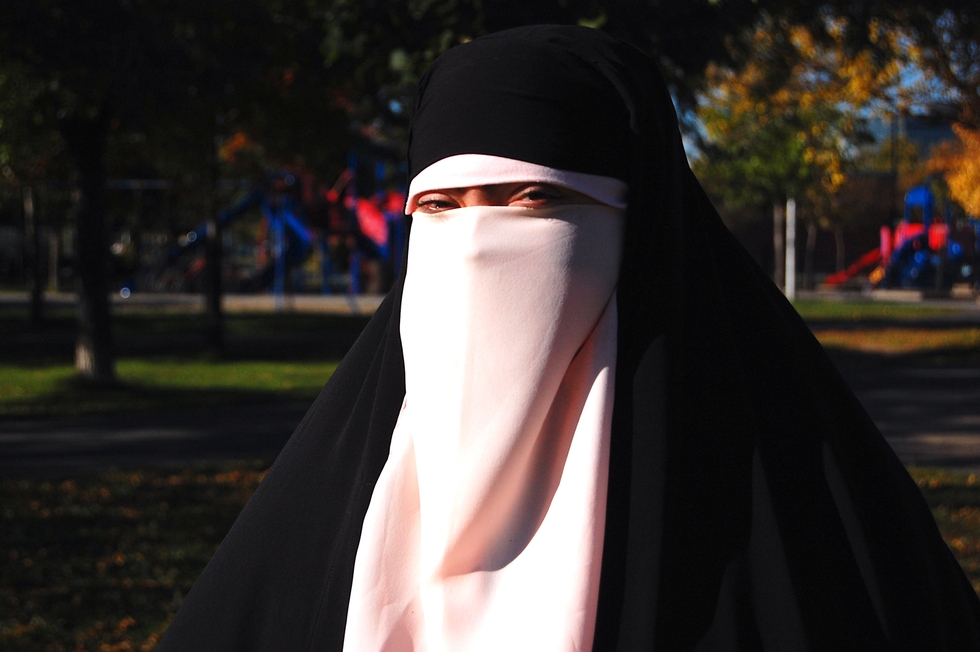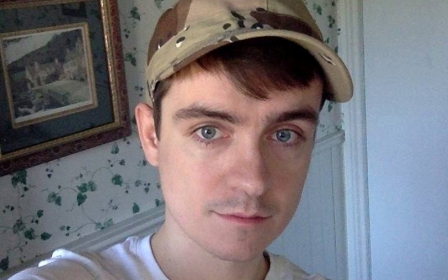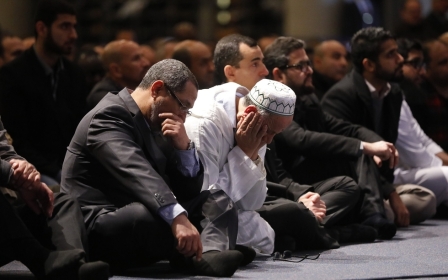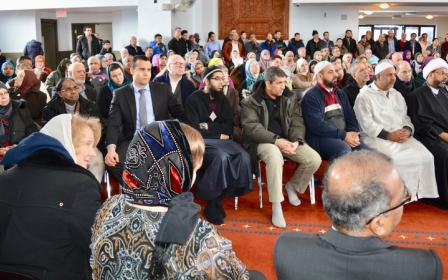'Second-class citizens?': Muslim women fear Quebec law banning veil

MONTREAL, Quebec – Warda Naili cried when she heard the news.
“Women like me, who wear the niqab, you don't see many of us, you don't hear from many of us,” Naili told Middle East Eye last Friday from a park near her home in a north end neighbourhood of Montreal.
“When this law was passed, I said... ‘Does [this law] mean... we're second-class citizens?’”
Born and raised Catholic in Montreal, Quebec’s largest city, the 33-year-old converted to Islam when she was 19.
She covered her hair with a headscarf (hijab) five years after she converted, and in 2011, she chose to wear a full-face veil, known as a niqab.
Now, after the Quebec government passed a law forcing citizens to uncover their faces before they can give or receive public services, Naili says she fears a hostile backlash in public and a loss of her independence.
Naili said she was spat on, on multiple occasions, while wearing a hijab, and only a few days after she first started wearing a niqab in public, someone shouted, “Are you hiding a bomb under that thing?” at her.
She already tells her loved ones whenever she leaves the house for safety reasons.
“It's already difficult what we're living. We're already living [through] threats and insults. Now this will increase the aggressiveness" of members of the public who are against the niqab in general, she said.
‘I should see your face and you should see mine’
Passed on 18 October in the Quebec legislature, the law, known as Bill 62, has been framed as an issue of religious neutrality.
It obliges public sector employees to work with their faces uncovered and citizens of Quebec to show their faces when accessing public services, including in hospitals and schools.
A recent amendment to the law - which was first tabled in 2015 and applied only to provincial service providers - extended its scope to include municipalities and public transit agencies across Quebec.
Quebec’s Liberal party, which holds a majority in the legislature and voted in favour of the law, said Bill 62 is the culmination of over a decade of debate over the reasonable accommodation of minorities and religious symbols in the province.
“We are in a free and democratic society,” Quebec Premier Philippe Couillard said last week. “You speak to me, I should see your face and you should see mine. It’s as simple as that.”
The provincial government says the law would apply to individuals wearing anything that covers their face, including dark sunglasses, winter scarves, or hoodies, and does not target a specific religious group.
Effectively, however, the law forces a very small number of Muslim women who cover their faces with a niqab or burka to unveil in order to access services, including riding a public bus.
The exact number of women who wear the niqab in Quebec is not known. Estimates say no more than 100 Muslim women don the garment in the province.
While it entered into force last week, how the law will be implemented continues to cause confusion.
Municipalities have also raised questions about how they will be able to meet the requirements of the law, while the Union of Quebec Municipalities called it “untenable”.
Law panned by human rights groups, other provinces
People across the country have also spoken out against the legislation.
The legislature in Ontario, Canada’s most populous province, unanimously condemned it in a recent resolution. “Religious freedom is part of our identity,” Ontario Premier Kathleen Wynne said.
“Forcing people to show their faces when they ride the bus, banning women from wearing a niqab when they pick up a book from the library will only divide us,” Wynne said.
The National Council of Canadian Muslims, a countrywide advocacy group, said the bill infringes on religious freedom and discriminates against Muslim women in Quebec.
“By tabling this discriminatory legislation, the Quebec government is advancing a dangerous political agenda on the backs of minorities, while pandering to bigoted populism instead of practising principled governance," NCCM executive director Ihsaan Gardee said in a statement.
Before the bill was passed last Wednesday in Quebec’s National Assembly, the Canadian Civil Liberties Association also described it as “a deeply troubling law that would infringe basic rights and cannot be justified in a free and democratic society”.
The federal government, meanwhile, has said it will “look carefully” at what the law entails, but stopped short of saying whether it will challenge Bill 62 in court.
“I don't think it's the government's business to tell a woman what she should or shouldn't be wearing,” Prime Minister Justin Trudeau told reporters last week, as he campaigned ahead of a federal by-election in Quebec.
“As a federal government, we are going to take our responsibility seriously and look carefully at what the implications are,” Trudeau said.
Religious accommodation expected
The provincial government appeared to slightly backtrack in the face of the criticism this week, as Quebec Justice Minister Stéphanie Vallée held a press conference today to clarify the tenets of the law.
Vallée said face coverings would need to be removed for the purposes of identification and security when accessing public services, not for the duration of the service being offered.
For instance, women who wear the niqab would need to uncover their faces when boarding a public bus, but could put their niqab back on while in their seats.
Emergency medical services will still be offered to anyone, with or without a face covering, the minister said.
Vallée also said exemptions for religious reasons would be possible and guidelines for those accommodations are expected before the end of June.
However, individuals seeking an exemption will have to apply separately to each government ministry or provider of the public services they are requesting, she said.
“You don't have one precise body that will grant an accommodation for all services because it varies case by case; what is the request, what is the nature of the service that is required?” Vallée said at a news conference Tuesday morning.
“All of this is different from one service to another,” she said.
However, Amnesty International Canada’s francophone branch criticised the province’s plan for accommodation more generally, saying the system did not meet international norms.
“It is not up to individuals to demonstrate a need for accommodation, but up to the state to justify a restriction on the freedom to exercise your religion or conviction,” Amnesty said in a statement.
The law itself is “incoherent” with international law, the group said.
“This law targets a specific religious practice: the Muslim religion as exercised by women wearing the niqab or the burka,” said Béatrice Vaugrante, director of Amnesty’s francophone branch, in the statement.
“How can a government force women not to dress in a certain way? That reinforces stereotypes and doesn’t resolve any potential coercion while accentuating discrimination.”
Not letting hatred win
Warda Naili, meanwhile, said Bill 62 would have real consequences on her life and the lives of other Muslim women who wear the niqab in Quebec, including a loss of independence and the ability to travel freely without fear.
Ultimately, she said the issue is about having the freedom to choose what you wear.
“The question is not a question of religion. If you have the right to be how your conscience dictates you to be, why couldn’t I be how my conscience dictates me to be?” she said.
“It would be so easy to take it off,” Naili added.
“But if I take it off, not only would I be missing a part of myself… but it would be like I’m giving reason to hatred. Hate would win.
“No. Never.”
New MEE newsletter: Jerusalem Dispatch
Sign up to get the latest insights and analysis on Israel-Palestine, alongside Turkey Unpacked and other MEE newsletters
Middle East Eye delivers independent and unrivalled coverage and analysis of the Middle East, North Africa and beyond. To learn more about republishing this content and the associated fees, please fill out this form. More about MEE can be found here.




